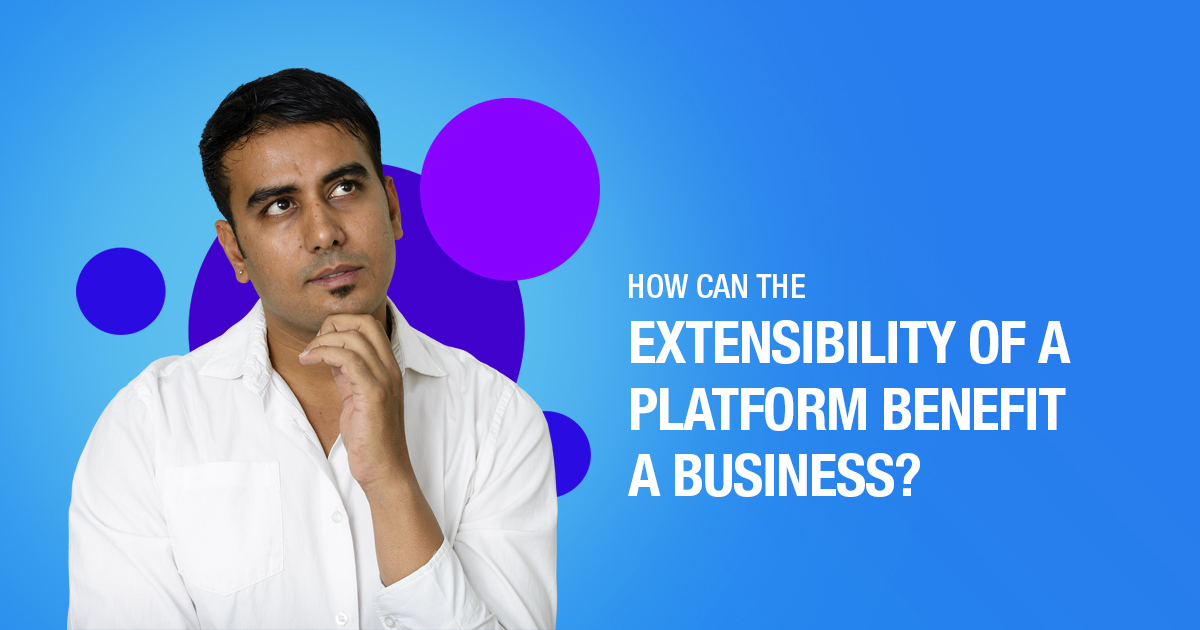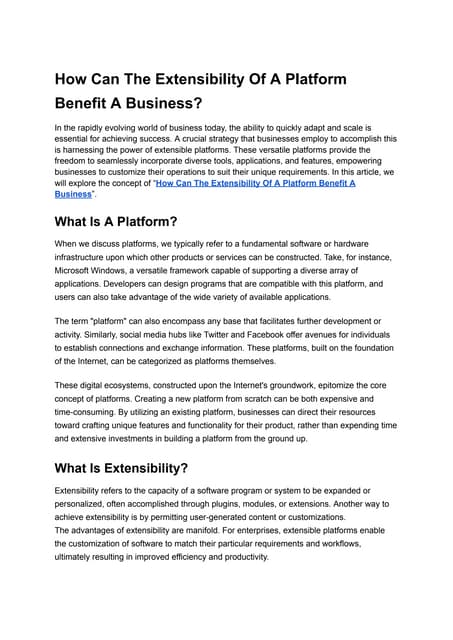How Can The Extensibility Of A Platform Benefit A Business

Imagine a bustling marketplace, not of fruits and vegetables, but of digital tools. Each stall offers a specialized service – accounting software, customer relationship management, data analytics, and more. But instead of operating in silos, these services seamlessly connect, enhancing each other’s capabilities. This interconnectedness, this ability to adapt and grow with your needs, is the essence of platform extensibility, and it's reshaping how businesses thrive.
At its core, the extensibility of a platform refers to its capacity to be modified, customized, and enhanced beyond its initial, out-of-the-box functionalities. This opens up a world of possibilities, allowing businesses to tailor the platform to their precise requirements, integrate it with other essential systems, and adapt swiftly to changing market conditions, ultimately driving innovation and efficiency.
The Power of Adaptability: A Brief History
The concept of platform extensibility didn't emerge overnight. In the early days of software, systems were often monolithic, designed to perform specific tasks with little room for modification or integration. Businesses were forced to adapt their processes to fit the software, leading to inefficiencies and frustration.
However, as technology advanced and the need for greater flexibility became apparent, software developers began to embrace modular architectures and open APIs (Application Programming Interfaces). This shift enabled third-party developers to create add-ons, plugins, and integrations, extending the functionality of the core platform and catering to niche requirements. Salesforce, for example, pioneered the app marketplace concept, allowing developers to build and distribute applications that seamlessly integrate with its CRM platform.
The Rise of APIs and the Ecosystem Advantage
APIs are the linchpin of platform extensibility. They act as digital bridges, allowing different software systems to communicate and exchange data. This enables businesses to connect their platforms with a vast ecosystem of tools and services, creating a synergistic effect that enhances overall productivity.
Consider a small e-commerce business using a platform like Shopify. Through APIs, they can integrate their store with accounting software like QuickBooks, email marketing platforms like Mailchimp, and customer support systems like Zendesk. This seamless integration streamlines operations, eliminates manual data entry, and provides a holistic view of the customer journey.
Benefits Beyond Integration: Customization and Innovation
Extensibility goes beyond simply connecting different systems; it empowers businesses to customize the platform to their specific needs. Whether it's adding new features, modifying existing workflows, or creating unique user interfaces, extensibility enables businesses to shape the platform to align with their unique brand identity and operational requirements.
Furthermore, extensibility fosters innovation. By opening up the platform to third-party developers, businesses can tap into a wealth of creativity and expertise. These developers can create specialized solutions that address emerging needs or solve industry-specific challenges. This collaborative approach accelerates innovation and ensures that the platform remains at the forefront of technological advancement.
Examples in Action: Real-World Scenarios
The benefits of platform extensibility are evident across various industries. In healthcare, for instance, electronic health record (EHR) systems can be extended with specialized modules for telemedicine, remote patient monitoring, and data analytics. This allows healthcare providers to deliver more personalized and efficient care.
In the financial services industry, platforms can be extended with tools for fraud detection, risk management, and regulatory compliance. This helps financial institutions to protect themselves from cyber threats and maintain compliance with evolving regulations.
Consider the example of a manufacturing company. By extending their ERP (Enterprise Resource Planning) system with IoT (Internet of Things) sensors on their equipment, they can gain real-time insights into machine performance, predict potential failures, and optimize maintenance schedules. This proactive approach minimizes downtime, reduces costs, and improves overall efficiency.
Overcoming Challenges: Planning and Governance
While the benefits of platform extensibility are undeniable, it's important to approach it strategically. Poorly planned extensions can lead to compatibility issues, security vulnerabilities, and increased complexity.
Therefore, businesses need to establish clear governance policies for managing extensions. This includes defining standards for development, testing, and deployment, as well as implementing robust security measures to protect against potential threats. It's also crucial to carefully evaluate third-party extensions to ensure their reliability and compatibility with the existing platform.
Key Considerations for Implementation
Before embarking on a platform extensibility project, businesses should carefully assess their needs and objectives. What specific problems are they trying to solve? What are the desired outcomes?
It's also important to consider the technical expertise available within the organization. Do they have the necessary skills to develop and maintain extensions in-house? Or should they partner with a third-party developer?
Finally, businesses should prioritize security and compliance. Ensure that all extensions meet the required security standards and comply with relevant regulations. This will help to mitigate risks and protect sensitive data.
The Future of Extensibility: A Seamless and Intelligent Ecosystem
As technology continues to evolve, the role of platform extensibility will only become more critical. We can expect to see even greater integration between platforms, driven by advancements in AI (Artificial Intelligence) and machine learning.
Imagine a future where platforms can intelligently adapt to changing user needs, proactively suggest relevant extensions, and even automate the process of integration. This would create a truly seamless and intelligent ecosystem, empowering businesses to achieve unprecedented levels of efficiency and innovation.
According to a report by Gartner, "Composable applications, built using packaged business capabilities (PBCs), are becoming increasingly important for organizations looking to accelerate innovation and adapt to changing business requirements." This highlights the growing demand for modular and extensible software solutions.
Ultimately, the extensibility of a platform is not just about adding features; it's about empowering businesses to shape their own destiny. It's about giving them the flexibility to adapt, the freedom to innovate, and the power to thrive in an ever-changing world.


















